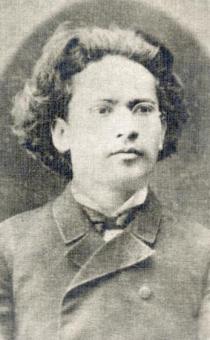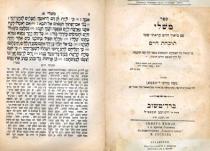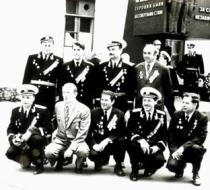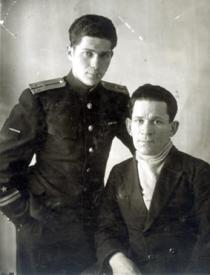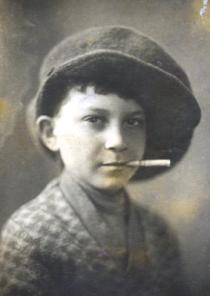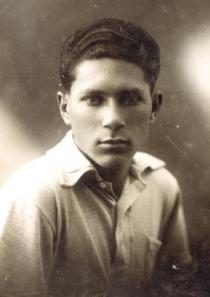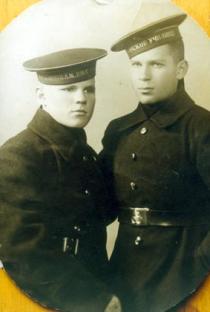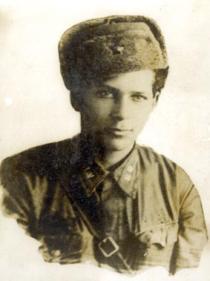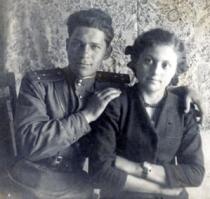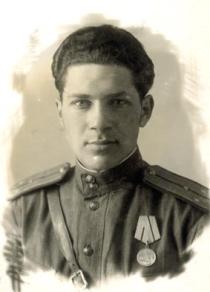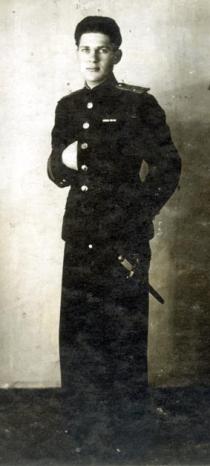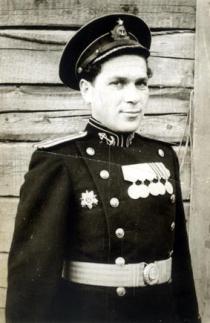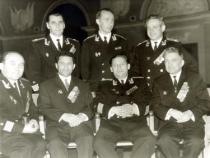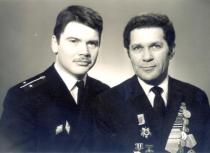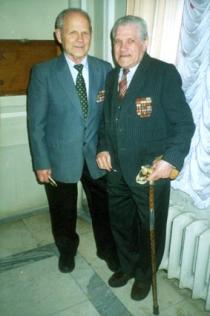I do not remember when and where this photo was taken. I guess my grandfather was 25 -30 years old at that time.
My paternal grandfather Boris Moisseevich was a poet. I have a book of his poems issued in 1890. He died very early, at the age of 37, from tuberculosis. I did not know him. And my grandmother Rebecca, as far as I know, was an owner of a bookstore and a stationer's shop. I never saw her and did not know her: she had died before I was born.
My grandfather had 2 brothers: Abram and Semen. They were called in a strange way: Abram 'Brichka' [Four-wheeler] and Semen 'Seriy' [Grey], and I do not know the reason.
They lived in Leningrad near the stadium named after Lenin, Zhdanovskaya embankment 3/1, 2nd floor (it is not in the center of the city, but on Petrogradskaya side). [At present Petrogradskaya side is one of the central districts of St. Petersburg.]
They had there an eight-room apartment. Later, after the Revolution of 1917, when the authorities started reducing space per person in living accommodation [they used to move poor homeless people to rich apartments of bourgeoisie], they gave four rooms to his relative Boris Zeydeman unbesought.
Later Boris left for Tashkent, where he worked in Tashkent conservatoire as a professor (a composer: he was an author of several musical compositions). [Tashkent is the capital of Uzbekistan.]
Before the war they showed film Submarine Ò9, where he was a composer. Uncle Semen, uncle Abram and Vitalia and Deborah (two sisters of my father) occupied four rooms: Vitalia in the first room, Deborah in the second one, both grandfathers slept in the third room, and the fourth one was their sitting room.
They also had a bathroom: they burned wood to heat it, because there was no central heating. But they had electricity supply (they lived in Leningrad, thank goodness!). There also was a large kitchen and two corridors.
They had a housemaid. Oh, no: they had a servant! At that time there were no housemaids, only servants, and I do not remember her name. She was Russian, she had lived at them for hundred years (from her childhood to her death).
By that time she was already very old: a good bit older than both my uncles (and they were about seventy or even older …). But she was full of mischief! I remember her, when she was younger. I knew her for about ten years: possibly from 1930s. And I do not remember when she died.
She was very slim, short, but full of mischief! She practically became a family member. She cooked, washed, and cleaned, and also helped me to take a bath. She used to heat the bathroom and say 'Let's go! Let's take a bath!' She was there to order about; she was the mistress of the house. She was paid for her job, moreover: when we came back or left the house, uncle Abram always told my father 'Moissey, have you given money?' It was always an extra sum of money. And my father used to leave money somewhere on the table (he never delivered anything into anybody's hands). Uncle Abram kept vigilant watch over it.
Abram Moisseevich was one of the most devout Jews in the town. Russian tsar Nicolas II held him in high respect and offered him a post of minister (sure, in case he denied his faith and accepted Christianity), but my uncle refused.
He wore ordinary (secular) clothes (a suit of clothes and a tie); he had no payes; He was very handsome, he had long gray hair, moustache and a beard. At that time all men had beards, and uncle Semen had it, too. Uncle Abram celebrated all Jewish holidays; he could read Hebrew well; he was religious. And uncle Semen was not so religious, but he took part in celebration of all holidays.
Polina, the wife of Abram Moisseevich (Polina Lesman) died, when I was a little boy: I did not know her. Judging from her photos, she was a real beauty.
The wife of Semen Moisseevich left for France together with an officer, she deserted her husband Semen and their son. It happened during the revolutionary days of 1917. And they never spoke about her. I never saw her.
Abram Moissevich died in 1937. And uncle Semen was evacuated from the besieged Leningrad during the war. After the end of the war he returned back to Leningrad and lived together with the son Moissey. He died here, in Leningrad in 1950s.

